The Early Christian Church [Overview]
The Early Christian Church describes the faith community that developed from followers of Jesus after He returned to heaven (Acts 1) in A.D. 31. Their purpose was to be witnesses of the life, death, and resurrection of Jesus and grow their faith community into a worldwide movement.
But this Early Christian Church was, in fact, neither Christian nor a “church.” It didn’t consist of a church building. And most of the men and women that began this movement were Jewish and saw themselves as a sect of Judaism. They didn’t plan to start a new religion.
They simply believed they were following the Old Testament prophets who had predicted the death and resurrection of the Messiah. From their understanding of the Scriptures, Jesus of Nazareth fulfilled these prophecies.
And as they shared that belief, it spread through the Roman Empire, starting a grassroots movement that is embraced by millions today.
But how did it all happen? On this page, we’ll break it down into the following topics:
- How the Early Christian Church started
- Major events in the Early Christian Church
- Key figures in the formation and growth of the Church
- How Christianity spread
- Lessons from the Early Christian Church
Let’s take a trip through time to first-century Palestine.
How the Early Christian Church started
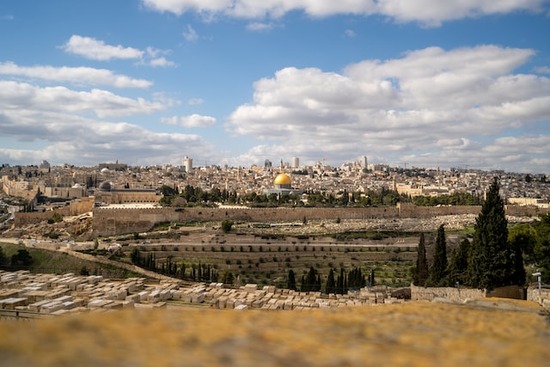
Photo by Dariusz Kanclerz on Unsplash
Since this movement was based on the teachings of Jesus Christ, it actually began with Jesus’ life here on earth. He mentored twelve Jewish men, known as His disciples, to serve and bless people the way He did. Then, after His resurrection, He commissioned them to go to all the world and share the things they’d seen and heard. They were to do the same as He had done—make disciples (Matthew 28:18-20).
These men recognized Jesus as the fulfillment of the Old Testament Messianic prophecies (Luke 24:25-27, 44-47).
Thus, they built their movement with Him as the foundation.
Jesus Himself said He would be the Church’s foundation (Matthew 16:15-18). The term for “church” in that passage in Matthew is the Greek word ekklesia, which means “called out.” Those who joined this movement were indeed “called out” for a higher purpose—to form this faith community. And some did end up leaving their old lives behind to do so.
When did it start?
The Early Church began sometime between A.D. 27 and 31.
Some consider the ordination (official recognition) of Jesus’ twelve disciples (Luke 6:13; Mark 3:14) as the start of the Church since the disciples become the leaders and spreaders of this new faith. This event occurred around A.D. 27.
Others mark the rise of the Church when Jesus commissioned these disciples (Acts 1) in A.D. 31.
Where did it start?
Christianity’s nucleus was in Jerusalem within the province of Judea (present-day Israel) during the reign of the Roman Empire.
Jesus had instructed His followers to wait in Jerusalem before expanding their ministry efforts to Samaria and beyond. They started closest to home.
Technically, the first Christians were in Antioch (Acts 11:26), because that’s where the followers of Jesus received that name. There, the Romans pejoratively called them “Christians,” meaning “followers of Christ.”1
And the name stuck.
The Early Christian Church, though predominantly Jewish at first, grew within the context of the famous Pax Romana, a peaceful and stable period of Roman rule.2
Being in a Roman world actually worked in the Christians’ favor because the empire was united by one language—Greek—and an extensive system of roads. The Christian movement could spread quickly and easily.
However, the Romans didn’t always remain peaceful toward Christians. We’ll learn more about that as we go through the timeline of the Early Christian Church.
Major events in early Christian history
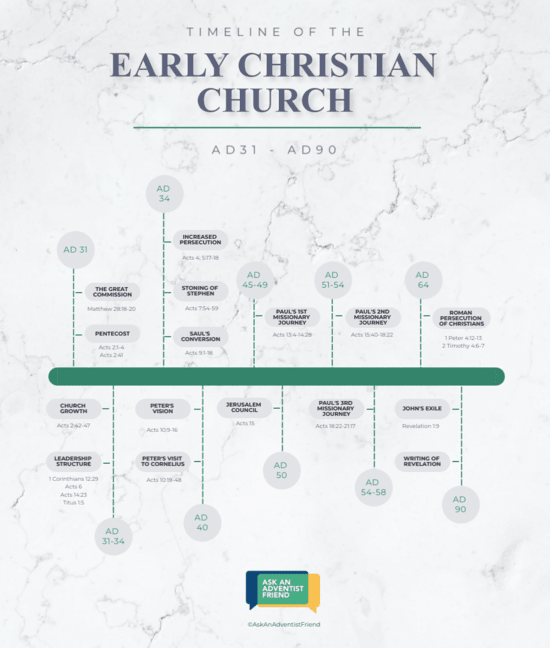 The New Testament book of Acts records many events that affected the early Christian Church and helped it grow. We’ll also learn about some historical events not covered within the Bible.
The New Testament book of Acts records many events that affected the early Christian Church and helped it grow. We’ll also learn about some historical events not covered within the Bible.
A.D. 31—The Great Commission
This is the name given to Jesus’ final charge to His followers before He returned to heaven. Found in Matthew 28:18-20, it included:
- Instructions to grow the community of faith through making more disciples, baptizing them, and teaching them
- The promise of Jesus’ presence
A.D. 31—Pentecost
Right before Jesus ascended to heaven, He reminded His followers that they were to be His witnesses throughout the earth. But first, they were to wait in Jerusalem for the Holy Spirit to give them power (Acts 1:8).
And, so, they waited—120 of them.
But they weren’t twiddling their thumbs. They prayed together and organized themselves for ministry (Acts 1:12-26).
After ten days, the Holy Spirit came upon them “like a mighty rushing wind” and “divided tongues as of fire appeared to them and rested on each one of them. And they were all filled with the Holy Spirit” (Acts 2:1-4, ESV).
This sudden experience empowered them to preach the gospel in different languages, surprising the Jews of various nationalities who were visiting Jerusalem at the time for a Jewish feast. What was going on?
Peter took the opportunity to explain.
Acts 2 records the sermon he preached, telling the people that the outpouring of the Holy Spirit fulfilled the Old Testament prophecies. Jesus had died, resurrected, and ascended to heaven, and this event resulted from Him being seated at the right hand of God (verses 22-36).
Convicted, 3,000 people decided to join this new movement that day.
A.D. 31-34—The growth and organization of the church
From Pentecost on, the church grew rapidly. These new members became part of a community of people who lived close-knit lives together. Acts 2:42-47 tells us that they:
- Had regular fellowship in one another’s homes
- Ate together
- Worshiped in the temple
- Supported one another financially
- And continued to grow!
With greater numbers came a need for organization. The Early Christian Church developed at least three categories of leadership:
1. Apostles
2. Deacons
3. Elders
Apostles comes from the Greek word apostolos, which can be translated as “delegate” or “messenger.”3
Generally, the apostles held the highest level of authority in the church (1 Corinthians 12:29). Most were eyewitnesses of Jesus, such as Peter, James, John, and the other original disciples. Paul was also included because of his encounter with Jesus (Acts 9).4
Deacons were first appointed in Acts 6 to help distribute supplies to the poor. Their ministry within the church was more logistical, though they also spent time preaching about Jesus.
Elders were local church leaders. When Paul helped start smaller groups of Christians in different cities and regions, he would appoint elders to serve there (Acts 14:23; Titus 1:5).
A.D. 34—The stoning of Stephen and increasing persecution
Within the first few years after Pentecost, Jewish opposition against believers in Jesus increased (Acts 4; Acts 5:17-18). This opposition culminated in the first martyrdom when the Jews stoned a prominent Christian leader named Stephen.
Despite the hardships, God even worked through the persecution to disperse Christians throughout the Roman Empire (Acts 8:4). As a result, the gospel spread beyond the Jewish population to all the then-known world.
The blessings promised to the Jewish nation went to all those who accepted Christ:
“There is neither Jew nor Greek, there is neither slave nor free, there is no male and female, for you are all one in Christ Jesus. And if you are Christ’s, then you are Abraham’s offspring, heirs according to promise” (Galatians 3:28-29, ESV).
A.D. 34—Saul’s conversion
Saul was a Jewish leader in Jerusalem who was an ardent persecutor of Christians (Acts 8:3); he had even been present at Stephen’s stoning. But everything changed when Saul had a miraculous encounter on his way to the city of Damascus.
Acts 9:1 tells us that he left for Damascus while he was “still breathing threats and murder against the disciples of the Lord” (ESV).
Once there, he would have more opportunities to overturn this “false” religion.
But on his way, a bright light blinded him and knocked him to the ground.
“Saul, Saul, why are you persecuting Me?” a voice spoke to him (Acts 9:4, ESV).
“Who are You, Lord?” he asked (verse 5).
“I am Jesus, whom you are persecuting. But rise and enter the city, and you will be told what you are to do” (verses 5-6).
Still blinded, Saul had to be assisted the rest of the way to Damascus. There, he waited for three days, pondering everything that had happened to him. God then sent a Christian by the name of Ananias to Paul, giving him a special calling:
“Brother Saul, the Lord Jesus who appeared to you on the road by which you came has sent me so that you may regain your sight and be filled with the Holy Spirit” (verse 17).
Saul’s life was changed. And with it, his name. He became known as Paul and became an influential leader within the Christian church as he shared how God had turned His life 180 degrees (Acts 26:16-18).
A.D. 40—Peter’s vision and visit to Cornelius
Though the gospel had started going to Gentiles (non-Jews), God had a plan to help it spread further. The Jews, in thinking of themselves as God’s special people, had developed prejudices toward Gentiles. These cultural barriers needed to be broken down, so God gave Peter a vision and told him to go and teach the gospel to a Roman centurion named Cornelius.
God was helping the Christians to realize that culture and nationality didn’t matter to Him: “you are all one in Christ Jesus” (Galatians 3:28, ESV)
Acts 10 describes Cornelius as a devout man who had followed God to the best of his ability and had been praying for truth. An angel came to him and told him to send a message to Peter.
Meanwhile, God gave Peter a vision in which He made it clear that Peter shouldn’t call any person “unclean.” God wanted them all to accept Him.
Peter taught the gospel to Cornelius and his household, who all accepted it with enthusiasm. And to Peter’s surprise, the Holy Spirit came upon them, too.
This experience allowed Peter to explain to other Jewish Christians that the gospel wasn’t exclusive; it was for everyone (Acts 11:1-18).
A.D. 45-49—Paul’s first missionary journey
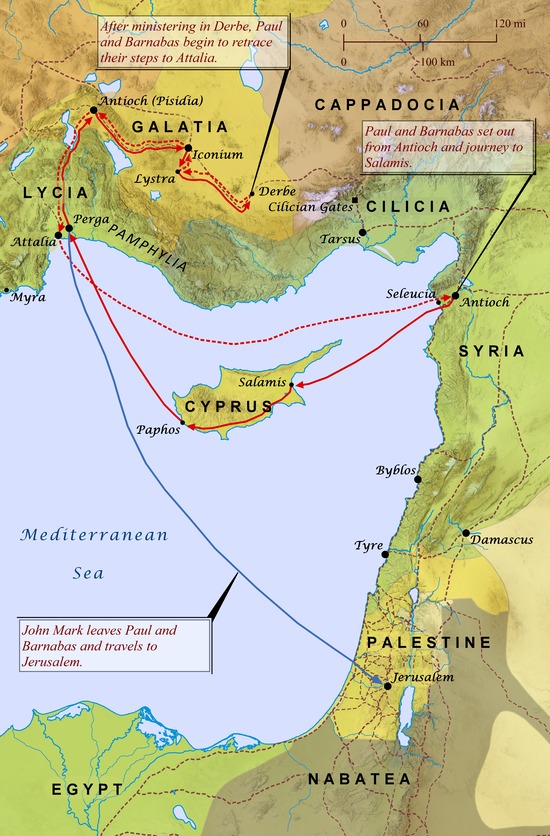
Courtesy of biblemapper
As Jewish Christians began to understand God’s plan for the gospel to go to everyone, a group of believers in Jerusalem recognized the calling of God on Paul’s life (Acts 13:1-3). He and Barnabas, a man in the church who had mentored Paul, set off on a journey throughout Asia Minor to preach the gospel.
On their journey, they established faith communities along the way and appointed elders for each of them (Acts 14:23).
Their journey, lasting a few years, included the following cities and regions:
- Cyprus
- Perga
- Antioch in Pisidia
- Iconium
- Lystra
- Derbe
A.D. 50—The Jerusalem Council
As the number of non-Jewish members in the church increased, a disagreement arose about whether non-Jewish Christians should have to perform Jewish rites to receive salvation. Unable to resolve the issue, church leaders decided to hold a general council in Jerusalem—the “headquarters” of the Early Christian Church.
Many key Christian leaders attended this meeting, including Peter, Paul, and Barnabas.
During the meeting, recorded in Acts 15, Peter shared his experience with Cornelius and how the Holy Spirit came upon the Roman household.
Then, Paul and Barnabas described their experiences preaching to Gentiles during their missionary journey. God blessed the Gentile converts, even though they didn’t follow Jewish rites.
Finally, James, a leader of the church group at Jerusalem, gave a speech in which he cited an Old Testament promise that God’s salvation would come to the Gentiles also (Acts 15:16-17; Amos 9:11-12). After all, God created every human being. He wants to save everyone!
These three presentations helped everyone conclude that the Jewish practice of circumcision was unnecessary for any religious reason.
A.D. 51-54—Paul’s second missionary journey
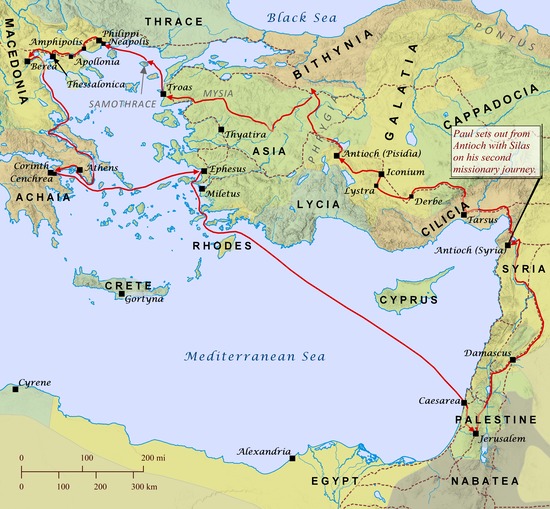
Courtesy of biblemapper
Paul went on his second missionary journey soon after the Jerusalem Council. This time, he took a man named Silas with him. This journey would last about three years and include visits to many churches he’d helped start on his first trip.
- Derbe
- Lystra
- Phrygia and the region of Galatia
- Philippi
- Thessalonica
- Berea
- Athens
- Corinth
- Ephesus
During this trip, Paul’s typical mode of ministry was to begin by visiting the Jewish synagogues and connecting with people there (Acts 17). If the Jews were hostile, he would move on and reach out to non-Jews.
A.D. 54-58—Paul’s third missionary journey and arrest
Paul’s third missionary journey was the last time he would travel before his first arrest.
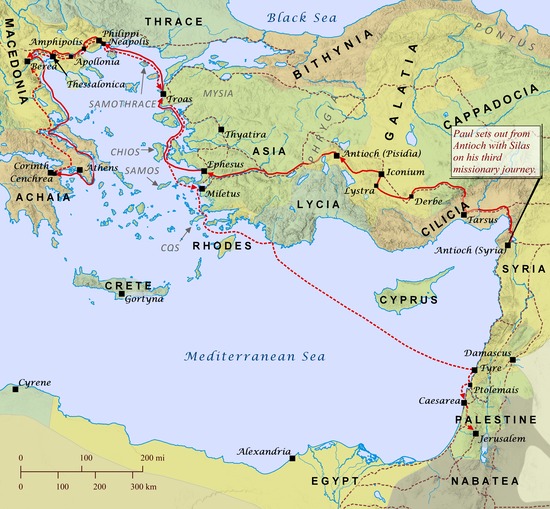
Courtesy of biblemapper
He visited:
- Derbe
- Lystra
- Iconium
- Antioch in Pisidia
- Phrygia
- Philippi
- Thessalonica
- Berea
- Athens
- Corinth
- Troas
- Milletus
- Tyre
- Ptolemais
- Caesarea
During the trip, he spent two years in Ephesus, where he taught new believers in the school of Tyrannus (Acts 19:9-10).
When he returned to Jerusalem, some Jews stirred up trouble about Paul, resulting in a mob and Paul’s arrest by the Roman authorities (Acts 21). The rest of the book of Acts mentions his trials and travels to Rome as a prisoner but doesn’t explain what happened to him afterward.
Scholars believe that Paul was released and was able to travel again before his second arrest and martyrdom sometime between AD 66 and 68.
A.D. 64—Roman persecution of Christians
For the first 30 years or so of the Early Christian Church, much of their persecution came from the Jews. But in AD 64, the Romans began to see the Christians as a threat against their influence.
That year, when part of Rome burned, Nero—the Roman emperor at the time—made Christians the scapegoat and blamed them for the fire.6
Roman persecution began in all its brutality—with the famed Roman Colosseum at its center. Roman citizens would come to the Colosseum for entertainment. There, they’d laugh and jeer as Christians were burned alive, tortured, or torn apart by lions.7
The apostle Paul was most likely beheaded during this time.8
A.D. 90—John’s exile and writing of Revelation
John was the last apostle alive during the Roman persecution.
And he wasn’t exempt from the hardships. He himself was arrested and then exiled to the island of Patmos (Revelation 1:9).
But God had a special surprise for him there. Though John was all alone, Jesus appeared to him in visions (Revelation 1) and guided him in writing Revelation, the last book of the New Testament.
His death marked the end of the generation of the apostles and the early years of the Christian church. But he and the others left behind a legacy of writings that would become the New Testament and would encourage and support believers for centuries.
How did Christianity spread?

Photo by Michele Bitetto on Unsplash
The Christian faith went throughout the then-known world as God guided it. Throughout the book of Acts, the Holy Spirit came upon the believers and gave them the strength, inspiration, and courage to share their beliefs.
Despite persecution and other challenges, the Early Christian Church was unstoppable because God empowered it.
God also used some other factors to propel the spread of Christianity.
Christianity’s unique teachings
Christianity was different from the many other religions in the Roman Empire. These other religions were polytheistic, meaning their adherents had many separate dieties or gods, such as Jupiter, Juno, and Mars. The Romans also worshiped “many small personal and household spirits.”9
Christianity was a major contrast in that it had grown out of Judaism, a monotheistic (one-God) religion. It required that its followers give up their allegiance to any other gods to serve the one true God.
The Roman gods demanded sacrifices in exchange for their favor. It seemed like it was never possible to appease them.
With this kind of religion and the sense of instability people felt after their conquest by the Roman Empire, many longed for “a faith which would bring them self-respect.”10
Christianity offered that faith. It taught of a personal God who lovingly created humans and give them value; and a God who was willing to come to the earth and sacrifice Himself for His people—rather than demanding sacrifices from them.
This kind of selfless love displayed on the cross was difficult to grasp (1 Corinthians 1:23-24). But when people accepted it, it spurred them to commit their lives to Christianity and do everything to stand true to it.
The writings of the apostles
As the apostles grew old and died or suffered martyrdom, the congregations sensed a greater need for guidance and instruction. They began preserving the writings of Paul and of the other apostles—writings that would eventually become part of the New Testament canon.11
These epistles, meticulously copied and then read aloud during worship services, served as a source of encouragement for the new believers and sustained them through difficult times.12
Persecution
Persecution, rather than hindering the Early Christian Church, actually bolstered its spread and deepened people’s convictions. As a second-century Christian named Tertullian said, “The blood of martyrs is seed.”
For one, persecution led believers to scatter throughout the Roman Empire, taking the truths of the gospel with them. As a result, more people heard about Jesus and accepted Him.
Persecution also developed a deeper faith in the believers that helped them to endure. They clung to Jesus and the truths of the Bible even more. By having to stand up for their beliefs, they grew in their faith and inspired others.
Though at times discouraged by persecution, the believers chose to rejoice because it was an opportunity to “share Christ’s sufferings” (1 Peter 4:13, ESV).
Key figures in the formation and growth of the church
Though many individuals played important parts in the Early Christian Church (and there’s no doubt there are some who are unnamed), we’ll look at a few key individuals:
- Simon Peter
- James
- John
- Stephen
- Paul
- Barnabas
- Timothy
Simon Peter

Photo by Xavier Smet on Unsplash
Simon Peter was a fisherman from Galilee who became one of the 12 disciples (Matthew 4:18; 10:2). He was one of the three people in Jesus’ inner circle (Matthew 17:1; Mark 5:37) along with John and James.
He recognized Jesus’ divinity early on (Matthew 16:16) and became a spokesperson for the disciples (Mark 8:29; 11:21; 14:29). He continued to take this role later in the Early Christian Church, too, as demonstrated by his sermon during Pentecost (Acts 2).
But Peter didn’t start out that way. He’d even been a coward who denied that he knew Jesus (Matthew 26:35, 69-75).
But his story wasn’t over.
After Jesus was resurrected, He assured Peter of His forgiveness (John 21). It transformed Peter, making him bold and unashamed of the gospel.
He became a key church leader in Jerusalem with a particular burden to reach out to the Jews (Galatians 2:7). God also used him to help break down barriers between Jewish and Gentile believers (Acts 10).
Peter left behind his legacy in the form of the epistles with his name, 1 and 2 Peter.
According to tradition, he was martyred—possibly crucified—in A.D. 64 during the reign of Nero13. One thing we can be sure of—He no longer feared death for the One he loved most.
James
The James we’re referring to here is James the brother of Jesus (Matthew 13:55; Mark 6:3; Galatians 1:19). Though a skeptic of Jesus’ ministry at first, he became a believer when Jesus appeared to him after the resurrection (1 Corinthians 15;7). Acts 1 mentions him as being with the apostles in the upper room at Pentecost.
Though we don’t know much about James, we do know he was prominent in the Christian Church (Acts 21:18) and a leader of the group in Jerusalem (Acts 15; Galatians 2:9). He also wrote the epistle of James.
He was killed by the Jews in A.D. 61.14
John
John was one of the three disciples who were closest to Jesus. Though he started as a “son of thunder” because of his fiery temper (Luke 5:10-11; 9:54-56; Mark 3:17), he stuck close to Jesus and allowed himself to be softened and molded.
He often referred to himself as the one “whom Jesus loved” (John 13:23, NKJV; John 20:2, NKJV; John 21:20, NKJV).
After Pentecost, John became a “pillar” in the church (Galatians 2:9), presumably in Jerusalem, though we don’t hear much more about him until the book of Revelation.
There, he describes his exile on the island of Patmos (Revelation 1:9-10). This exile most likely took place during the reign of Emperor Domitian around A.D. 90.
His writings in the Bible—the Gospel of John, the epistles of 1, 2, and 3 John, and Revelation—were significant to the Early Christian Church and remain so to this day.
Stephen
Stephen was the first martyr in the history of Christianity (Acts 7:54-60). He was a man of “good repute, full of the Spirit and wisdom” and “full of faith” (Acts 6:3, ESV; Acts 6:5, ESV).
Church leaders saw the promise in Stephen and appointed him as a deacon. The Bible describes him as “full of grace and power…doing great wonders and signs among the people” (Acts 6:8, ESV).
But because of Stephen’s incredible skill and talent in sharing the gospel, he was falsely accused and brought before the highest council of Jewish leaders—the Sanhedrin—who sentenced him to death.
Yet even as he faced death, he submitted himself to God and prayed for the forgiveness of his murderers (Acts 7:59-60).
This example of Stephen may have impacted someone in the crowd who was watching—Paul (Acts 7:58).
Paul
Paul, originally known as Saul, was a zealous persecutor of Christians until he became an equally zealous promoter of Christianity (Acts 8:3).
The difference? His miraculous encounter with Jesus on the road to Damascus (Acts 9).
This young man was a Pharisee, meaning he held a high leadership position within the Jewish community (Philippians 3:5-6). He also had the benefits of Roman citizenship (Acts 22:27).
He was an educated individual who was very skilled in reasoning and bold in speech (Acts 9:29). When he first became a follower of Jesus, Acts 9:22 tells us that he “increased all the more in strength, and confounded the Jews who lived in Damascus by proving that Jesus was the Christ” (ESV).
A few years later, God called him to preach to non-Jews (Galatians 2:7-9). Thus began his missionary journeys. He completed at least three trips around the Mediterranean, each lasting 3-4 years.
Paul also wrote many epistles to encourage the various Christian communities he helped start; these epistles form a significant portion of the New Testament. They are:
- Romans
- 1 and 2 Corinthians
- Galatians
- Ephesians
- Philippians
- Colossians
- 1 and 2 Thessalonians
- 1 and 2 Timothy
- Titus
- Philemon
- Hebrews
Paul was imprisoned for his faith twice near the end of his life. Despite his status, he gained the respect of the guards and was able to share Christ as well as write some of his epistles and receive visitors (Philippians 1:12-13)—something that many prisoners only dreamed of.
Though we don’t know precisely when Paul died, scholars believe he died in Rome during the persecution by Nero.15
Barnabas
Barnabas, a Levite from the island of Cyprus, had a behind-the-scenes role in the accounts of the Early Christian Church. But a very important role, nonetheless, because he was an encourager (Acts 4:36; 11:24).
He especially fulfilled this role by taking Paul under his wing and mentoring him. Because of Paul’s background as a persecutor of Christians, many apostles were initially skeptical of him.
But Barnabas vouched for Paul’s character change (Acts 9:27; 11:25-26).
The two worked together for a few years, and Barnabas went with Paul on his first missionary journey (Acts 13:2-4).
He would’ve probably gone on the second as well, but the two disagreed on whether to bring the inexperienced John Mark with them. Barnabas, ever the one to see potential in people, decided to take John Mark and part ways with Paul (Acts 15:37-39).
Timothy
Timothy was like a son to Paul (1 Timothy 1:2; 1 Corinthians 4:17). He was half-Jewish and half-Greek and had become a follower of Jesus. At a young age, he had a good reputation among the other Christians, and Paul decided to take him on his missionary journeys (Acts 16:1-3).
Together, they traveled and encouraged the new churches (Acts 16:5). Sometimes, Timothy would stay behind to support the believers while Paul continued to other locations (Acts 17:14).
When Paul was imprisoned in Rome, Timothy came and stayed with him.
Later, he took a leadership role in the church in Ephesus. Paul wrote epistles to him, encouraging him not to be ashamed of his youth but to wholeheartedly lean into his ability to lead and set an example (1 Timothy 4:12).
What the Early Christian Church can teach us
Though the Early Christian Church grew exponentially and impacted the whole world of the first century, it still had its human challenges and hiccups. But that humanness allows us to learn lessons from its trials and glean hope from its triumphs.
Here are a few of those lessons.
Unity in diversity
The church was unified in its stand for biblical truth and its love for Christ. But within that unity were also many differences. Paul’s epistles show us that each congregation had different needs and challenges.
But despite differences, we’re all part of the body of Christ, and God can use our differing strengths and weaknesses as we join together to serve others (Romans 12:5-8). Our faith is not defined by nationality, race, or culture but by Jesus Christ (Galatians 3:28).
Conflict resolution
Disagreements are normal among humans, but the question is: How do we handle those disagreements?
For example, Paul and Barnabas couldn’t agree on whether they should bring young John Mark on a missionary journey with them. But instead of giving up, they simply decided to part ways and continue doing ministry separately (Acts 15:37-39).
The early Christians also faced some theological controversies, but they were able to resolve these issues at the Jerusalem Council by keeping focused on their ultimate goal—spreading the gospel (Acts 15).
As we face conflicts within our spheres today, let’s determine to seek solutions that’ll glorify God rather than hinder His work.
Thriving under any circumstances
Circumstances don’t have to determine whether the church grows or shrinks. God’s followers can thrive under any government, economic condition, or culture. And His Word can spread against significant odds, even severe persecution.
If God wants something to happen, we can trust He’ll see the mission through:
“If God is for us, who can be against us?” (Romans 8:31, ESV).
Dependence on God
The Early Christian Church depended fully on Christ and His power to sustain them and lead them forward. When commanded to stop preaching Christ and even faced with imprisonment, they didn’t react out of fear; instead, they turned to God in prayer. (See one example in Acts 4.)
God was their dependence. They kept in mind that “no one can lay a foundation other than that which is laid, which is Jesus Christ” (1 Corinthians 3:11, ESV).
And we can take this reminder to heart.
Yes, the Early Christian Church may seem like it was superhuman.
But in many ways, the early Christians were just like us—ordinary people. Ordinary people who gave an extraordinary God access to their lives. As they kept their focus on Him, He empowered their witness.
That’s how they made a difference in the world. And that’s how we can make a difference too.
- “Christian,” The Oxford Companion to the Bible, p. 110-111. [↵]
- “Acts of the Apostles: Introduction,” Seventh-day Adventist Bible Commentary, vol. 6. [↵]
- “Apostle,” The Oxford Companion to the Bible, p. 41.[↵]
- Ibid. [↵]
- “The Early Christian Church,” Seventh-day Adventist Bible Commentary, vol. 6. [↵]
- “Roman Empire,” The Oxford Companion to the Bible, p. 658 [↵]
- Paganism to Christianity in the Roman Empire, pp. 168-169 (in Seventh-day Adventist Bible Students’ Source Book) [↵]
- The Rise of Christianity, p. 102 [↵]
- Ibid., p. 13 [↵]
- Ibid. [↵]
- White, Michael, From Jesus to Christianity, p. 260 [↵]
- Lindgren, Caleb, “Reading Together, Early Church Style,” Christianity Today, April 20, 2018 [↵]
- “Simon Peter,” The Oxford Companion to the Bible, p. 695 [↵]
- “James, Brother of Jesus,” Ibid., p. 339 [↵]
- The Rise of Christianity, p. 62 [↵]
Related Articles
Questions about Adventists? Ask here!
Find answers to your questions about Seventh-day Adventists
More Answers
Why Many Seventh-day Adventists Choose a Vegetarian Diet
Why Many Seventh-day Adventists Choose a Vegetarian Diet?You may have an Adventist friend who is vegetarian, or maybe you’re attending a Seventh-day Adventist Church for the first time and notice the potluck doesn’t have any meat. This isn’t unusual in Adventism. In...
The Health Benefits of Fresh Air You Should Know About
The Health Benefits of Fresh Air You Should Know About“When you can’t breathe, nothing else matters,” the American Lung Association tells us. And while that’s true, the kind of air you’re breathing will determine the health benefits you experience. Breathing fresh...
What Do Seventh-day Adventists Choose to Eat?
What Do Seventh-day Adventists Choose to Eat?Food blogs overwhelm the internet; food fads are all the rage; and copycat and healthy versions of food are the subject of many a get-together. Eating—and eating the best way—is a big deal. And everybody has a different...
10 Incredible Ways Sunlight Can Improve Your Health
10 Incredible Ways Sunlight Can Improve Your HealthAre you concerned about sunlight’s negative effects? You might be the one who lathers on the sunscreen and covers up when you go outside. Or maybe you avoid being outside as much as possible. You might be surprised,...
Why Is Water So Important?
Why Is Water So Important?We all know that water is a substance we can’t live without. It quenches our thirst and keeps us hydrated on the inside. And it’s necessary for hygiene and cleansing on the outside too. But did you know that the cleansing properties of water...
Ellen White’s Writings and the Adventist Health Message
Seventh-day Adventists are known for their emphasis on healthy living. And Ellen G. White was a significant influence in the development of this priority and practice among Adventists.
Health Clinics
Ellen White and Adventist Healthcare—Ahead of Their Time Medical care in the mid-1800s was primitive, to say the least. Basic concepts we take for granted—such as proper handwashing or recognizing the dangers of bloodletting—were nonexistent. And doctors often had...
What Did Ellen White Teach about Vegetarianism?
What Did Ellen White Teach about Vegetarianism?One thing you might have heard about Seventh-day Adventists is their emphasis on a vegetarian lifestyle. If you’re wondering why that is, it goes back to our church’s humble beginnings: As Adventists studied the Bible,...
How Ellen White’s Teachings Can Improve Your Health
How Ellen White’s Teachings Can Improve Your Health Healthcare in the nineteenth century was said to leave “more disease than it took away” with its use of bloodletting and “medicines” like mercury and arsenic.1 As people questioned these methods, new approaches...
Change Your Perspective on Life with These 5 Mindsets
5 Biblical Mindsets to Change Your Life for the Better Sometimes, life is just plain hard. There’s no way around it. So would thinking about things differently really change anything? Our perspective on life, and everything it throws at us, affects more than we’re...
Bible Promises for When You’re Worried or Fearful
Bible Promises for When You’re Worried or Fearful The Bible is full of beautiful promises that can comfort us in a variety of situations. They can give us hope when we are hopeless, make us feel grateful for God’s love, and comfort us when we’re grieving or suffering....
12 Practical Ways to Overcome Worry
12 Practical Ways to Overcome Worry DISCLAIMER: This content is for informational purposes only. It does not constitute any professional medical advice and is not intended as a substitute for professional mental health therapy. It’s easy to get stuck in a cycle of...
How the Bible Talks About Worry, Fear, and Anxiety
How the Bible Talks About Worry, Fear, and Anxiety Worry and fear are the ingredients of anxiety. It’s easy to see how the world isn’t perfect—and the anticipation of a bad event or experience (that may or may not even happen) can end up draining the peace and...
How to Calm Anxious Thoughts, Using the Bible
How to Calm Anxious Thoughts, Using the Bible You were expecting a phone call from your daughter half an hour ago, and she still hasn’t called. She’s also not answering your calls. You feel your heart thumping as your thoughts race: What if she’s been in a car...
What You Should Know About the Adventist Health Studies
What You Should Know About the Adventist Health StudiesYou may have heard that Seventh-day Adventists care about health. But what you may not know is that Adventists have been the subjects of long-term research into lifestyle and health. Since 1958, researchers from...
Benefits of Sunlight
Yes, There Are Health Benefits of SunlightDespite the bad reputation it’s gotten, sunlight is generally associated with positivity, as shown by songs like “You Are My Sunshine,” or phrases that refer to delightful people as having a “sunny disposition.” There’s a...
Why Your Body Needs Rest for Optimal Health
Why Your Body Needs Rest for Optimal HealthStruggling to think straight? Wondering why you can’t remember that important tidbit you heard earlier today? Feeling like your emotions are about to explode? These are just some of the symptoms that can reveal your need for...
The Seventh-day Adventist Diet: One of Our Key Longevity Secrets
The Seventh-day Adventist Diet: One of Our Key Longevity SecretsOats, avocados, lentils, tofu—probably not what you first think of in a standard American diet. But if you show up at the home of an Adventist, chances are you may be served one of these staples. Out of a...
Why You Need Fresh Air
Why You Need Fresh Air“When you can’t breathe, nothing else matters,” the American Lung Association tells us. We couldn’t agree more! Breathing in clean air is an essential part of caring for our bodies, which God has given us. Together with other health principles,...
Sabbath Meal
Everything You Need to Know About Sabbath MealsFor Seventh-day Adventists, sharing a Sabbath meal with friends and family is one of the most special and memorable parts of the Sabbath. That’s why we want to share with you all about Sabbath meals and why they’re such a...
Adventists and Healthy Living
Adventists and Healthy LivingWhat’s the Adventist “Health Message” All About? One thing Seventh-day Adventists are known for is their emphasis on living healthy lives. Since our bodies are living temples of the Holy Spirit (1 Corinthians 6:19, 20), we strive to stay...
Water’s Importance—Physical Benefits and Spiritual Applications
Water’s Importance—Physical Benefits and Spiritual Applications We all know that water is a substance we can’t live without. Not only does it quench our thirst and keep us hydrated from the inside, but it’s necessary for hygiene and cleansing on the outside as well....
How Important is a “Day of Rest?”
How Important is a “Day of Rest?” Why God Created a Day for Downtime by Martin Casper Do you ever experience the feeling of complete overload? Do you feel like the only way you can get ahead is by slamming it 24/7? I hear these types of comments more and more...
7 Reasons Why a Day of Rest is Important
7 Reasons Why a Day of Rest is ImportantWe live in a fast-paced world. It seems as if success is measured in how much you can do in a short amount of time. (Extra points for the service or product that is available 24/7). The idea that we will be more successful if we...
How do Adventists choose what to eat?
How do Adventists choose what to eat?Every day, parents go through the ritual of getting their kids to eat what is healthy and good while trying to steer them away from what can hinder the growth of their developing bodies. Nutritionists work with their clients to...
How Can I Have a Better Marriage?
Is it possible to have a happy marriage?
Why are many Adventists Vegetarian?
Why are many Adventists Vegetarian?The diet intended for man is outlined in Genesis 1:29, “And God said, ‘See, I have given you every herb that yields seed which is on the face of all the earth, and every tree whose fruit yields seed; to you it shall be for food.’”...
Didn’t find your answer? Ask us!
We understand your concern of having questions but not knowing who to ask—we’ve felt it ourselves. When you’re ready to learn more about Adventists, send us a question! We know a thing or two about Adventists.























